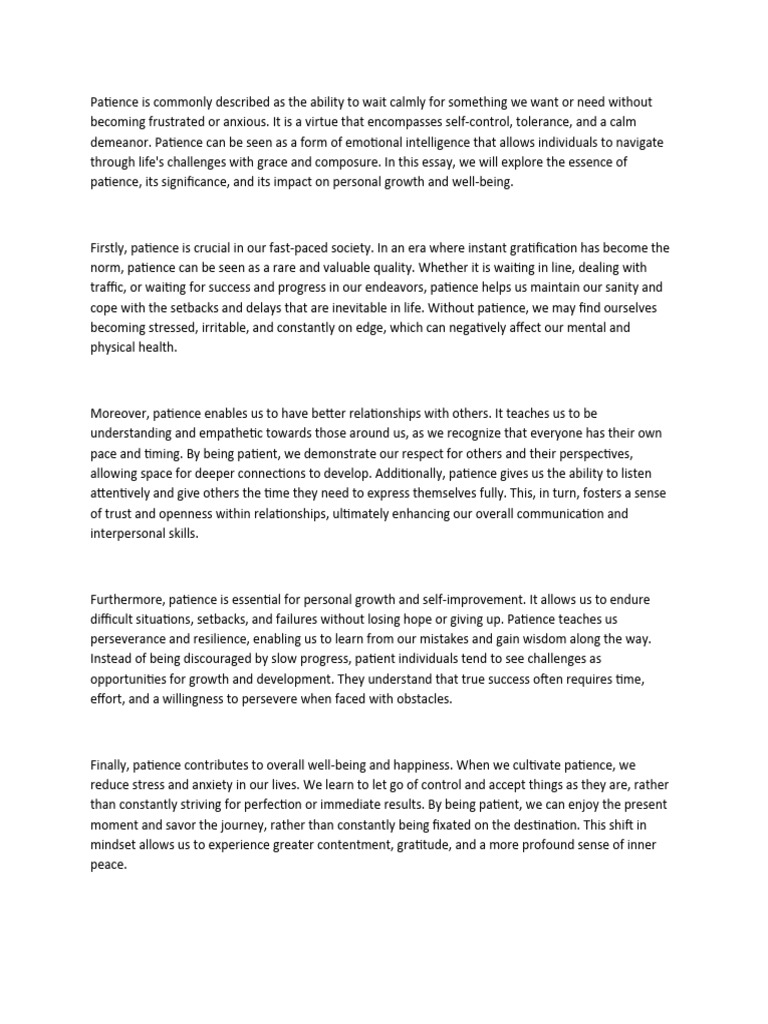The recent pandemic has served as a crucible for humanity, revealing both vulnerabilities and strengths that define the human experience. In these tumultuous times, one of the most essential virtues extolled by the Bahá’í teachings emerges prominently: patience. Patience, often perceived merely as the ability to wait, encompasses a broader spectrum of resilience, acceptance, and understanding. This virtue is essential not only in personal development but also in our interactions with the world. Through the lens of the Bahá’í Faith, we can examine the manifold forms of patience that can be adopted during adversity.
Patience manifests in several dimensions, each fostering unique forms of resilience. The first is **patience in the face of trials**. The COVID-19 pandemic has wrought havoc on global health, economies, and social structures. Individuals faced unprecedented restrictions, uncertainties, and losses. The Bahá’í teachings encourage individuals to develop a patience that is proactive; it entails actively seeking meaning and learning amidst adversity. This approach acknowledges that trials are not merely obstacles but opportunities for spiritual growth. Credit for understanding and cultivating such patience can be traced back to the fundamental belief in the continuous evolution of the soul, which happens in shifting paradigms of experience.
Next, we delve into **patience in relationships**. Social distancing measures have transformed how people connect, and many have felt the pangs of isolation. The Bahá’í Writings emphasize the importance of community and unity. However, during a pandemic, maintaining relationships—be it familial, platonic, or professional—can become challenging. Practicing patience in this context involves fostering empathy and understanding. It requires individuals to extend grace to one another amidst frustration, as varying responses to stress and anxiety can lead to discord. Patience here is not merely passive; rather, it catalyzes forgiveness and encourages supportive dialogues that acknowledge differing emotional responses.
Moreover, the concept of **patience with oneself** is paramount. The ongoing pandemic has spurred a global wave of anxiety, self-doubt, and a lingering sense of inadequacy. Adapting to change requires an internal dialogue that is seasoned with self-compassion. The Bahá’í perspective teaches that the pursuit of perfection is a lifelong journey. Thus, developing patience with oneself is the acknowledgment that growth is often accompanied by setbacks. This form of patience nurtures resilience and encourages individuals to view their challenges with a lens of learning rather than condemnation.
Another significant dimension is **patience in the pursuit of justice**. The pandemic has illuminated social inequities, prompting a collective awakening to injustices faced by marginalized communities. The Bahá’í teachings underscore the importance of justice as a pivotal principle in society. Patience in this realm concerns maintaining steadfastness in advocacy and commitment to equity. It demands that we understand change is often incremental and may require persistent efforts that span generations. This perspective cultivates a long game mentality, reinforcing that each step taken towards justice, regardless of how small, contributes towards a more equitable society.
Equally important is **patience in accepting the unknown**. The pandemic has rendered many aspects of life unpredictable, leading individuals to grapple with uncertainty on a daily basis. The Bahá’í Faith teaches that acceptance of the unknown can serve as a pathway to tranquility. Acknowledging that while we strive for control, many elements are outside of our influence can forge a deeper sense of peace. It encourages us to engage with the present rather than fixate on anxieties about the future. This form of patience helps cultivate a mindset that embraces adaptability, allowing individuals and communities to navigate unprecedented challenges with grace.
Incorporating **patience into daily practice** can significantly enhance overall well-being. The Bahá’í community advocates for spiritual practices that cultivate patience, such as prayer and meditation. These practices serve not only as a respite from stress but also as a profound means of connecting with the divine, fostering inner peace and resilience. During the pandemic, many have turned to these practices as a source of solace, reflecting a deepened appreciation for the stillness that facilitates personal reflection and connection with God.
Ultimately, the lessons learned during this pandemic serve as a testament to the interconnectedness of humanity. The Bahá’í teachings propose that patience is not a solitary endeavor but a communal responsibility. As society navigates recovery, the cultivation of patience can lead to greater unity and collaboration, fostering a spirit of togetherness amid the trials that the world continues to face. By embracing the diverse forms of patience advocated within the Bahá’í Faith, individuals may emerge from this pandemic not only with enhanced resilience but also with a deeper commitment to the values that bind humanity in a shared journey toward justice, peace, and spiritual development.
In conclusion, the multifaceted nature of patience extends beyond mere endurance; it encapsulates an overarching philosophy that can transform the human experience. As individuals and communities reflect on the trials presented by the pandemic, the teachings of the Bahá’í Faith offer enduring principles that can guide us toward a more resilient and compassionate future.
